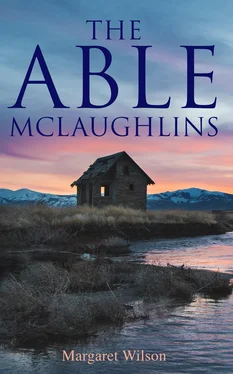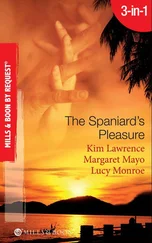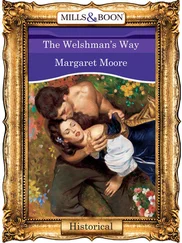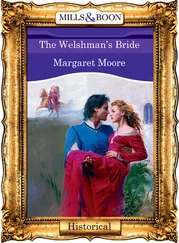Margaret Wilson - The Able McLaughlins
Здесь есть возможность читать онлайн «Margaret Wilson - The Able McLaughlins» — ознакомительный отрывок электронной книги совершенно бесплатно, а после прочтения отрывка купить полную версию. В некоторых случаях можно слушать аудио, скачать через торрент в формате fb2 и присутствует краткое содержание. Жанр: unrecognised, на английском языке. Описание произведения, (предисловие) а так же отзывы посетителей доступны на портале библиотеки ЛибКат.
- Название:The Able McLaughlins
- Автор:
- Жанр:
- Год:неизвестен
- ISBN:нет данных
- Рейтинг книги:5 / 5. Голосов: 1
-
Избранное:Добавить в избранное
- Отзывы:
-
Ваша оценка:
- 100
- 1
- 2
- 3
- 4
- 5
The Able McLaughlins: краткое содержание, описание и аннотация
Предлагаем к чтению аннотацию, описание, краткое содержание или предисловие (зависит от того, что написал сам автор книги «The Able McLaughlins»). Если вы не нашли необходимую информацию о книге — напишите в комментариях, мы постараемся отыскать её.
The Able McLaughlins — читать онлайн ознакомительный отрывок
Ниже представлен текст книги, разбитый по страницам. Система сохранения места последней прочитанной страницы, позволяет с удобством читать онлайн бесплатно книгу «The Able McLaughlins», без необходимости каждый раз заново искать на чём Вы остановились. Поставьте закладку, и сможете в любой момент перейти на страницу, на которой закончили чтение.
Интервал:
Закладка:
Margaret Wilson
The Able McLaughlins
e-artnow, 2020
Contact: info@e-artnow.org
EAN 4064066058579
Table of Contents
Chapter I
Chapter II
Chapter III
Chapter IV
Chapter V
Chapter VI
Chapter VII
Chapter VIII
Chapter IX
Chapter X
Chapter XI
Chapter XII
Chapter XIII
Chapter XIV
Chapter XV
Chapter XVI
Chapter XVII
Chapter XVIII
Chapter XIX
Chapter XX
Chapter XXI
Chapter XXII
CHAPTER I
Table of Contents
The prairie lay that afternoon as it had lain for centuries of September afternoons, vast as an ocean; motionless as an ocean coaxed into very little ripples by languid breezes; silent as an ocean where only very little waves slip back into their element. One might have walked for hours without hearing anything louder than high white clouds casting shadows over the distances, or the tall slough grass bending lazily into waves. One might have gone on startled only by the falling of scarlet swamp-lily seeds, by sudden goldfinches, or the scratching of young prairie chickens in the shorter grasses. For years now not even a baby buffalo had called to its mother in those stretches, or an old squaw broken ripening wild grapes from the creek thicket. Fifteen years ago one might have gone west for months without hearing a human voice. Even that day a traveler might easily have missed the house where little David and the fatter little Sarah sat playing, for it was less in the vastnesses about it than one short bubble in a wave’s crest. Ten years ago the children’s father had halted his ox team there, finishing his journey from Ayrshire, and his eight boys and girls alighting upon the summer’s crop of wild strawberries, had harvested it with shrieks of delight which broke forever the immediate part of the centuries’ silence. A solitary man would have left the last source of human noise sixty miles behind him, where the railroad ended. But this farsighted pioneer had brought with him a strong defense against the hush that maddens. He had a real house now. The log cabin in which he and his nine, his brother and his ten, his two sisters and their sixteen had all lived that first summer, was now but a mere woodshed adjoining the kitchen. The house was a fine affair, built from lumber hauled but forty miles—so steadily the railroad crept westward—and finished, the one half in wild cherry cut from the creek, and the other half in walnut from the same one source of wood. Since the day of the first McLaughlin alighting there had arrived, altogether, to settle more or less near him, on land bought from the government, his three brothers and four sisters, his wife’s two brothers and one sister, bringing with them the promising sum of sixty-nine children, all valiant enemies of quietness and the fleeing rattlesnakes. Some of the little homes they had built for themselves could be seen that afternoon, like distant specks on the ocean. But Sarah and David had no eyes just then for distant specks.
They had grown tired of watching the red calf sleep, and Davie was trying to make it get up. Finally in self-defense, it rose, and having found itself refreshed, began gamboling about, trying its length of rope, its tail satisfactorily erect. The two had to retreat suddenly to the doorstep where Hughie sat, so impetuous it grew. Hughie was not, like the others, at home because he was too small to go to school. Indeed, no! Hughie was ten, and at home to-day because he had been chilling, the day before, with the fever that rose from the newly-broken prairie. The three of them sat quiet only a moment.
“Why does he frisk his tail so?” Davie asked.
“He’s praising the Lord,” replied Hughie, wise and wan.
“Is he now!” exclaimed Davie, impressed. “Does God like it?”
“Fine,” said Hughie. That was an easy one. “It’s in the Psalm. Creeping things and all ye cattle.”
Davie sat for some time sharing his Maker’s pleasure in the antics of happy calves. Then bored—perhaps like his Maker—he turned to other things. He rose, and went down the path towards the road, and stood looking down it, in the direction from which the older children must come, surely soon now, from school. Only here and there along that path where they would appear was the grass not higher than the children’s heads; in some places it was higher than a man on horseback. There seemed no children in sight.
But wasn’t that someone coming down there on the other road?
“I see somebody coming on the road, Hughie!” he called.
“You do not!” answered Hughie. It wasn’t at all likely anybody was coming. Yet in case anything so unusual was happening, he would just have a look. Sarah waddled after him.
Ship ahoy!
Was that really something moving down there in the further slough? The three stood still, peering across the prairie, hands sheltering eyes, barefooted, the boys in the most primitive of homemade overalls, Sarah in an apron unadorned, the golden autumn sunshine blowing around them. They stood looking. …
Then the home-coming children emerged from the tall grass into which the younger ones were strongly forbidden to go, because children sometimes got fatally lost in it, and at this signal the three ran to meet them, crying out the news. Gaining the little rise of ground again, upon which the house stood, they all paused together to look at whatever it was that drew near, Mary, the oldest of them, the teacher, Jessie and Flora, James and Peter.
Yes! There was no doubt about it now!
“ ’Tis a team!” cried Peter.
“ ’Tis a pair of grays!” he added in a moment. They were all perfectly motionless from curiosity now. Who had grays in that neighborhood?
“There’s two men in it,” Mary affirms.
Then Peter yells,
“One is wearing blue!” They can scarcely breathe now.
Blue! Can it be blue! This is too much for Mary.
“Run, Peter!” she cries. “Tell mother! Get father! It has the looks of a soldier!” It is three weeks now since the last battle, since word has come from Wully. The little girls are jumping about in excitement.
The children’s shouts had not at all disturbed the mother in the kitchen, where she sat sewing, until—could she believe her ears?—they were shouting, “ ’Tis Wully, mother! ’Tis Wully!” She ran out of the house, down the path.
“It never is!” she says, unsteadily. But she can see someone in blue, someone standing up, waving a cap now. She can see his white face. The children bolt down the road. She can see him, her black-bearded first-born. The driver is whipping up the horses. Home from battles, pale to the lips, he is in her arms. But she is paler.
“Run for your father!” she cries, to whoever will heed her. The children are pulling at him boisterously. The strange driver is patting his horses, his back to the family reunited. Hugged, and kissed, and patted and loved, the bearded Wully turns to the stranger.
“This is Mr. Knight, of Tyler, mother. He brought me all the way.”
“ ’Tis a kind thing you have done!” she exclaims, shaking his hand devoutly.
“Oh, he was a soldier. And he didn’t look able to walk so far.”
“You’re not sick!” she cries to Wully, scanning his face. Certainly he was not sick, now. He could have walked it, but he was glad he didn’t have to, he adds, smiling engagingly at the stranger. They stand together awkwardly, joy-smitten, looking at one another, excited beyond words. Then the mother leads the way to the unpainted house, the children hanging to Wully, dancing about.
The fifteen-year-old Andrew was working in the farther part of the field just below the house that afternoon, when he saw, from a distance, his father, called by Peter, suddenly leave his plow, and run towards the house surely faster than an old man ever runs. His own team was fly-bitten and restless, and he left it just long enough to see that in front of the house there was a team and a light wagon. He unhitched his half-broken young steers, urged them impatiently to the nearest tying place, and hurried to the house.
Читать дальшеИнтервал:
Закладка:
Похожие книги на «The Able McLaughlins»
Представляем Вашему вниманию похожие книги на «The Able McLaughlins» списком для выбора. Мы отобрали схожую по названию и смыслу литературу в надежде предоставить читателям больше вариантов отыскать новые, интересные, ещё непрочитанные произведения.
Обсуждение, отзывы о книге «The Able McLaughlins» и просто собственные мнения читателей. Оставьте ваши комментарии, напишите, что Вы думаете о произведении, его смысле или главных героях. Укажите что конкретно понравилось, а что нет, и почему Вы так считаете.












